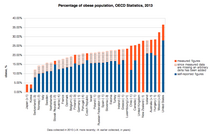If you FAIL, never give up because F.A.I.L. means “First Attempt In Learning.” END is not the end. In fact, END means “Effort Never…
Maintaining health
Achieving and maintaining health is an ongoing process, shaped by both the evolution of health care knowledge and practices as well as personal strategies and organized interventions for staying healthy.
Diet
Main articles: Healthy diet and Human nutrition
An important way to maintain your personal health is to have a healthy diet. A healthy diet includes a variety of plant-based and animal-based foods that provide nutrients to your body. Such nutrients give you energy and keep your body running. Nutrients help build and strengthen bones, muscles, and tendons and also regulate body processes (i.e. blood pressure). The food guide pyramid is a pyramid-shaped guide of healthy foods divided into sections. Each section shows the recommended intake for each food group (i.e. Protein, Fat, Carbohydrates, and Sugars). Making healthy food choices is important because it can lower your risk of heart disease, developing some types of cancer, and it will contribute to maintaining a healthy weight.[39]
The Mediterranean diet is commonly associated with health-promoting effects due to the fact that it contains some bioactive compounds like phenolic compounds, isoprenoids and alkaloids.[40]
Exercise
Main article: Physical exercise
Physical exercise enhances or maintains physical fitness and overall health and wellness. It strengthens muscles and improves the cardiovascular system.
Sleep
Main articles: Sleep and Sleep deprivation
Sleep is an essential component to maintaining health. In children, sleep is also vital for growth and development. Ongoing sleep deprivation has been linked to an increased risk for some chronic health problems. In addition, sleep deprivation has been shown to correlate with both increased susceptibility to illness and slower recovery times from illness.In one study, people with chronic insufficient sleep, set as six hours of sleep a night or less, were found to be four times more likely to catch a cold compared to those who reported sleeping for seven hours or more a night. Due to the role of sleep in regulating metabolism, insufficient sleep may also play a role inweight gain or, conversely, in impeding weight loss.Additionally, in 2007, the International Agency for Research on Cancer, which is the cancer research agency for the World Health Organization, declared that "shiftwork that involves circadian disruption is probably carcinogenic to humans," speaking to the dangers of long-term nighttime work due to its intrusion on sleep. In 2015, the National Sleep Foundation released updated recommendations for sleep duration requirements based on age and concluded that "Individuals who habitually sleep outside the normal range may be exhibiting signs or symptoms of serious health problems or, if done volitionally, may be compromising their health and well-being.
More energy IN than OUT over time = weight gain
 How to Maintain Your Health
How to Maintain Your Health
Health is something that is easy to take for granted. When we start losing it, it's hard to believe we spent so long not valuing it. To ensure that you stay as healthy as possible, we've outlined a guide that should help you do just that -- detailing your physical, mental, and emotional health. Why would you want to live any other way?
 Why Is a Healthy Weight Important?
Why Is a Healthy Weight Important?
Reaching and maintaining a healthy weight is important for overall health and can help you prevent and control many diseases and conditions. If you are overweight or obese, you are at higher risk of developing serious health problems, including heart disease, high blood pressure, type 2 diabetes, gallstones, breathing problems, and certain cancers. That is why maintaining a healthy weight is so important: It helps you lower your risk for developing these problems, helps you feel good about yourself, and gives you more energy to enjoy life.
What Is Overweight and Obesity?
Overweight is having extra body weight from muscle, bone, fat, and/or water. Obesity is having a high amount of extra body fat. Body mass index (BMI) is a useful measure of overweight and obesity. The information on this Web site will provide you with information about BMI (including limitations of this measure) and how to reach and stay at a healthy weight. Talk to your health care provider if you are concerned about your BMI.
 What Factors Contribute To a Healthy Weight?
What Factors Contribute To a Healthy Weight?
Many factors can contribute to a person’s weight. These factors include environment, family history and genetics, metabolism (the way your body changes food and oxygen into energy), and behavior or habits.
Energy Balance
Energy balance is important for maintaining a healthy weight. The amount of energy or calories you get from food and drinks (energy IN) is balanced with the energy your body uses for things like breathing, digesting, and being physically active (energy OUT):
- The same amount of energy IN and energy OUT over time = weight stays the same (energy balance)
More energy OUT than IN over time = weight loss
To maintain a healthy weight, your energy IN and OUT don’t have to balance exactly every day. It’s the balance over time that helps you maintain a healthy weight.
You can reach and maintain a healthy weight if you:
- Follow a healthy diet, and if you are overweight or obese, reduce your daily intake by 500 calories for weight loss
- Are physically active
- Limit the time you spend being physically inactive




